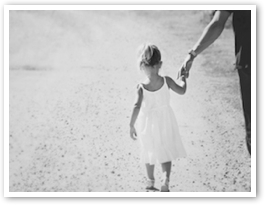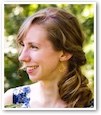Love is stronger than death
- SOPHIE CALDECOTT
As a young child, my father often told me that I was beautiful.
 Despite the twists and turns that have come about as I've grown older, in relationships, schooling, and jobs, I have always been protected to a certain extent by a sense of self worth.
Despite the twists and turns that have come about as I've grown older, in relationships, schooling, and jobs, I have always been protected to a certain extent by a sense of self worth.
When I try to put my finger on all the things my father has given me over the years, I realize that his wisdom and love have been woven into the fabric of who I am. Perhaps it is hard to pinpoint one specific thing, but I know from experience that his gentle reminder of my beauty has been one of the greatest gifts. His love is a quiet steady voice against the clamor of a world constantly telling me that I should look or act differently; it helps me accept myself.
When I was young, one of my favorite things was having my father read stories aloud to me. He opened up books for me at bedtime like magic treasure chests that contained entire worlds, steering me through the works of J.R.R. Tolkien, C.S. Lewis, George MacDonald, Hans Christen Andersen, and Jane Austen, amongst many others. The heroes and heroines were flawed just like me, but they knew, in the end, the difference between right and wrong, and most importantly of all, they knew how to love. In his own quiet way, this is what my father has been teaching me all along.
One day last Autumn, he woke up in so much pain that he could barely walk, and he was rushed into the hospital for emergency scans. He had been feeling unwell since the spring, and had been to see the dentist and then the doctor about a swelling on his jaw, but all of the blood-work and other tests had come back negative and they had told him the lump was probably swelling in a gland after a major tooth extraction. He had a pain in his lower back, but after more tests, still no one knew what was causing it. We looked into seeing back specialists, hoping the pain could be massaged away.
The emergency scans finally revealed what the doctors had been puzzling over for so long; he was diagnosed with an advanced form of cancer. As the leaves started falling in great fiery swathes and the first frosts began, my family walked through hospital corridors, feeling like intruders that had walked into someone else's bad dream. My mind numbly reached for a parallel situation, something familiar with which to orient myself, and stumbled upon the first time we got a dog. In that moment, I had felt as if I was standing outside my body, looking back at my family. 'It's so funny,' I had said to my sisters, 'It's so funny. Now we're one of those dog families.'
It's so funny, I repeated to myself in the Oncology Ward, now we're one of those cancer families.
The medicine made his breath smell sweet, like flowers. The doctors made a mould of his face and blasted the tumours with radiation until his body had had as much as it could take. His pain diminished as the weeks went by, and they started him on the hormone treatment. How to kill the cancer, so deeply entwined, without killing his other cells? My little sister reluctantly got a train back to university to carry on with her interrupted term.
The waiting began.
When I was little, my father would often say to me, 'Don't lose yourself worrying about what might be coming. Look at the world and love it, love the details; look for a pattern in the clouds, or in a piece of moss.' This advice has stayed with me through childish bouts of homesickness, and more adult struggles as I tried to make my way into the world of work. But, it never resonated more deeply than it has over the past few months.
The heroes and heroines were flawed just like me, but they knew, in the end, the difference between right and wrong, and most importantly of all, they knew how to love. In his own quiet way, this is what my father has been teaching me all along.
After the initial fear and shock, life returned more or less to normal. Today, sometimes I forget that he has cancer, and the only sign that something is attacking the heart of our family is the increased closeness and honesty between us all. The overt affection and support for one another that has always been there is now a constant priority. There is no need for wishing we had done things differently. We are soaking each other up, drinking in smiles and jokes and mundane moments as we always have, pushing against the same darkness that threatens us all.
It is not so much that we need to be strong for each other — a phrase that people often quote as they grasp around for some piece of comforting wisdom. It is more that we need to be ourselves, weak and strong all jumbled up together. We do not talk about it much, we carry on as normally as possible, but when things are bad it isn't strength that keeps us going, it is empathy.
Suffering alongside each other doesn't mean that we are negative all the time. When he had an ultrasound on his tumours, dad joked about asking the doctor whether it was a boy or a girl. We laughed about how he wanted to be discharged from the hospital so that he could come home in time to watch his favorite Sunday night television program. It just means that we don't have to hide our tears from one another when we've had a bad day, that we can curl up on each other's beds and just lie there without needing to give a reason.
The deepest kind of strength, after all, is empathy, but strength seems like an inadequate word to describe it. It implies a stoicism, a hardness, when in reality what we need most of all when things are most difficult is a softness, a flexibility, an openness to roll with the punches, to bend and not break.
Life seems so fragile back in that hospital waiting room, but I have come to realise that in fact it is resilient even in the face of death. When life is built around love, it can outlast death, because death is not the end. The cancer is a sick imitation of the real thing, multiplying desperately because it has no real substance or meaning of its own beyond that which it destroys; that is the nature of evil.
It is almost impossible to say exactly how my father shaped who I am; his gentle manner, his childlike curiosity and awe about the world, his ability to listen and connect and speak right to the heart of the way things are with very few words are all qualities about him that I love, and I aspire to. But perhaps the most precious lesson that a father can teach his daughter — a lesson which helps her to deal with the possibility of losing him, in fact — is that love is stronger than death. I learnt this through the heroes and heroines of the stories that my father shared with me, and, like them, I will never despair or stop believing that the world is good.
 This is Meaghen Gonzalez, Editor of CERC. I hope you appreciated this piece. We curate these articles especially for believers like you.
This is Meaghen Gonzalez, Editor of CERC. I hope you appreciated this piece. We curate these articles especially for believers like you.
Please show your appreciation by making a $3 donation. CERC is entirely reader supported.

Acknowledgement
 Sophie Caldecott. "Love is stronger than death." Verily (May, 2014).
Sophie Caldecott. "Love is stronger than death." Verily (May, 2014).
Reprinted with permission from Verily Magazine.
Verily is a new kind of online women's magazine: one that celebrates the best of who women are. We feature fashion that is worthy of the woman, relationship articles that go beyond sex tips, and strong cultural and lifestyle journalism. Verily is the modern woman's go-to guide on how to lead a fulfilling, integrated life.
The Author
 Sophie Caldecott is a freelance writer and founder of A Better Place Journal. She grew up in Oxford, studied English Literature at Durham University followed by a Masters in Magazine Journalism at City University in London.
Sophie Caldecott is a freelance writer and founder of A Better Place Journal. She grew up in Oxford, studied English Literature at Durham University followed by a Masters in Magazine Journalism at City University in London.




